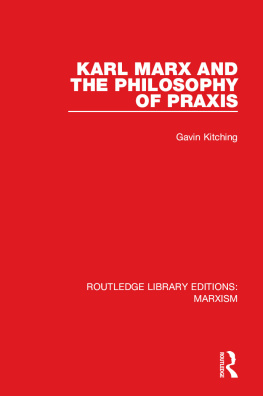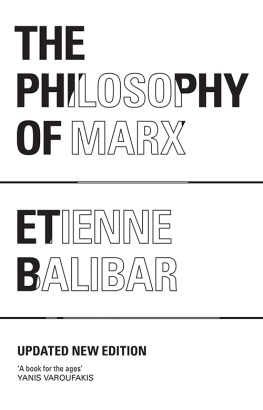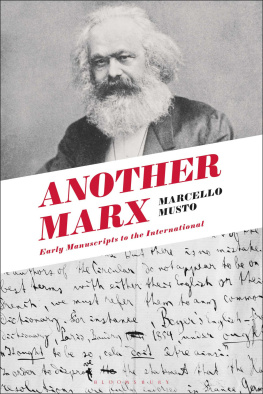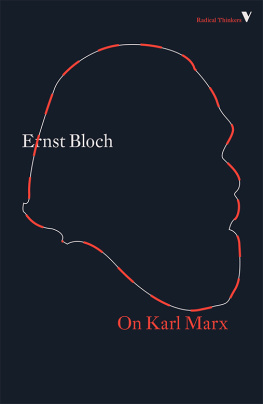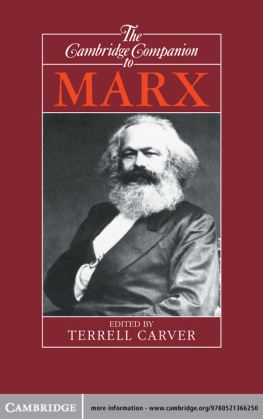Contents

Marx
Towards the Centre
of Possibility
Marx
Towards the Centre
of Possibility
Edited, translated, and
with an introduction
by Gavin Walker
Kjin Karatani


With support from the Japan Foundation
This English-language edition published by Verso 2020
Originally published in Japanese as Marukusu sono kansei no chshin, 1974
Kjin Karatani 2020
Translation and Introduction Gavin Walker 2020
All rights reserved
The moral rights of the author and translator have been asserted
1 3 5 7 9 10 8 6 4 2
Verso
UK: 6 Meard Street, London W1F 0EG
US: 20 Jay Street, Suite 1010, Brooklyn, NY 11201
versobooks.com
Verso is the imprint of New Left Books
ISBN-13: 978-1-78873-058-7
ISBN-13: 978-1-78873-779-1 (LIBRARY)
ISBN-13: 978-1-78873-059-4 (UK EBK)
ISBN-13: 978-1-78873-060-0 (US EBK)
British Library Cataloguing in Publication Data
A catalogue record for this book is available from the British Library
Library of Congress Cataloging-in-Publication Data
Names: Karatani, Kjin, 1941- author.
Title: Marx : towards the centre of possibility / Kojin Karatani.
Other titles: Marukusu sono kansei no chshin. English
Description: London ; Brooklyn, NY : Verso, 2020. | Includes bibliographical references and index. | Summary: Originally published in 1974, Kojin Karatanis Marx: Towards the Centre of Possibility has been amongst his most enduring and pioneering works in critical theory. Written at a time when the political sequences of the New Left had collapsed into crisis and violence, with widespread political exhaustion for the competing sectarian visions of Marxism from 1968, Karatanis Marx laid the groundwork for a new reading, unfamiliar to the existing Marxist discourse in Japan at the time. Karatanis Marx takes on insights from semiotics, deconstruction, and the reading of Marx as a literary thinker, treating Capital as an intervention in philosophy that could be read as itself a theory of signs. Marx is unique in this sense, not only because of its importance in post-68 Japanese thought, but also because the heterodox reading of Marx that Karatani debuts in this text, centered on his theory of the value-form, will go on to form the basis of his globally-influential work Provided by publisher.
Identifiers: LCCN 2019044487 | ISBN 9781788730587 (paperback) | ISBN 9781788737791 (library binding) | ISBN 9781788730600 (ebook)
Subjects: LCSH: Socialism. | Marxian economics. | Communism and literature. | Marx, Karl, 18181883.
Classification: LCC HX73 .K36413 2020 | DDC 335.4dc23
LC record available at https://lccn.loc.gov/2019044487
Typeset in Sabon by MJ & N Gavan, Truro, Cornwall
Printed and bound by CPI Group (UK) Ltd, Croydon CR0 4YY
Contents
I would like to thank above all Kjin Karatani himself, for discussions and exchanges on the present book, and for agreeing to the translation of this early work of his, which has had such an important effect on the development of critical theory in Japan.
Thanks to Michael Bourdaghs and Ken Kawashima for their support of the project, to Sebastian Budgen, Rosie Warren, Cian McCourt, and others at Verso for their editorial support, and to Rachel and Anne for their love and support.
I initially translated the text while I was a faculty fellow at the Institute for the Public Life of Art & Ideas at McGill University, and finished the final editing of the text while a visiting researcher at the Institute for Research in the Humanities at Kyoto University, a wonderful place to work. I thank Kenta Ohji for his invitation, and all the staff of the Institute for their support during my stay.
The translation and publication were made possible in part by support from the Japan Foundation UK, who provided a Translation Grant, and by support from the Social Sciences and Humanities Research Council of Canada.
Throughout this volume, Japanese language is transliterated according to the modified Hepburn system. Karatanis original text, like the bulk of Marxist theoretical writing in Japanese until recently, has only a very limited reference apparatus, with no bibliography, and no specific citations. For this English-language edition, all citations in the text have been sourced to original texts, or to their major English-language translations.
All texts of Marx and Engels have been referred to the editions of record: the Marx-Engels Collected Works (Moscow, London, New York: Progress Publishers, Lawrence & Wishart, and International Publishers) in English, and the Marx-Engels Werke (Berlin: Dietz) and Marx-Engels Gesamtausgabe (Berlin: Dietz) in German. I have added occasional footnotes marked [Trans.] for terms and concepts that Karatani mentions but that are not developed in the text, particularly in relation to the Japanese-language theoretical situation.
In Japanese-language Marxist theoretical writing, Marxs economic abbreviations are typically retained in the style of the German original. Hence W is used for Ware, G for Geld, Pm for Produktionsmittel, A for Arbeitskraft, etc. I have changed these to the standard English usage: C = commodity, M = money, Mp = means of production, L = labour power, c = constant capital, v = variable capital, s = surplus value.
In general, I have endeavoured to avoid a mode of translation which is, to be formally consistent with Karatanis argument in this text, nothing more than one particular reading protocol that accentuates the linguistic distance of the text. By that I mean something quite simple. There is a mode of translation that seeks, at all times, to render opaque yet distant the original text in its translated form. Such a mode emphasizes untranslatable terms, terms in the original left transliterated, forms of expression that seek to establish a stylistic difference that the reader is free (although also propelled) to regard as emblems of cultural divergence. I reject wholly this mode of translation, not because it is less accurate after all, accuracy is nearly impossible to coherently assess in translation but because it places the text within an economy of meaning that evades textuality in favour of a first-order explanatory mechanism of cultural difference. Needless to say, this apparent cultural difference is itself never explained, but simply relied upon as a given, initial stratum of meaning that is posited at the outset, or strictly speaking, pre-posited. Karatanis work is impossible to assess on such a basis. The context, properly speaking, of this work is the global spread of anti-humanist, anti-essentialist critical theory that entered the world conceptual scene in the late 1940s, and that has conditioned a crucial segment of intellectual history ever since. In that sense, I do not exoticize Karatanis writing, which is clear, straightforward, and although influenced by the current of deconstruction dominant at Yale in the 1970s when he was there, never attempted to appropriate the Derridean style. The book should be read absolutely without reliance on any conception of Japanese-ness as a supposed explanatory mechanism, but instead with an understanding that the Japanese tradition of social theory was itself undergoing remarkable international transformations at the time.



